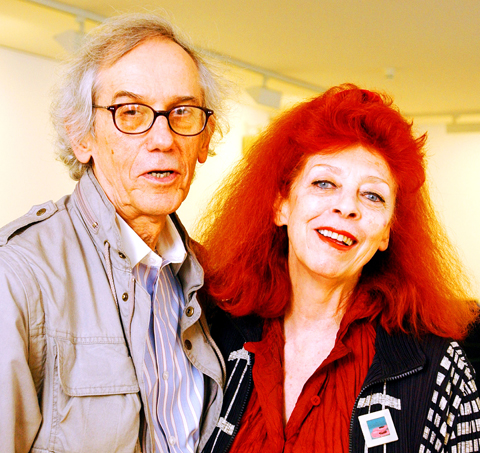The flame-haired artist Jeanne-Claude — or Mrs Christo, as she sometimes called herself — worked with her husband to mummify the Pont Neuf, to envelop a string of Miami islands in flamingo-pink nylon, to bind the German Reichstag building in aluminum fabric and to erect 7,503 billowing, saffron “gates” in Central Park, New York. She has died aged 74, from complications of a brain aneurism suffered after a fall.
Jeanne-Claude Denat de Guillebon was born in Casablanca, Morocco, where her father, a French general, was stationed at the time. She was born on exactly the same day as her husband and collaborator, Christo Javacheff.
“Both of us at the same hour,” Jeanne-Claude liked to say, “but, thank God, two different mothers.”

PHOTO: EPA
She often acted as spokesperson for the pair, explaining that as “twins,” they had an almost symbiotic relationship and spoke in one voice (usually hers).
“Sometimes we would both have the same idea at the same time,” she said. “You know how people who live with a dog start looking like their dogs?”
She was much more than simply his muse or manager. Until 1994, all their artworks bore only Christo’s name, apparently because they thought it would be easier for one artist to become established, but since then the pair have shared the credit. It was entirely her idea, Christo said after the fact, to create Surrounded Islands (1980-1983), which used 550,000m² of pink fabric to outline an archipelago in Miami as if with a highlighter pen (“a giant Pepto-Bismol spill,” one critic said).
Christo retroactively corrected the record and now they are acknowledged as joint authors of every outdoor installation they plotted from 1961 onwards. That year Christo proposed the wrapping of their first building, the Ecole Militaire in Paris.
She met Christo in 1958, soon after he moved to Paris from his native Bulgaria, where his father owned a textile factory. Influenced by Man Ray, who in 1920 wrapped a sewing-machine in a blanket, bound it with string and photographed it to illustrate the surrealist’s famous definition of beauty — “the chance encounter of a sewing-machine and an umbrella on a dissecting table” — Christo had begun to parcel objects. In his humble attic studio, he wrapped cans, bottles, shoes, chairs — which he considered his “real” art and autographed with his first name — while paying his way by washing dishes and painting conventional portraits, which he signed with his surname.
Jeanne-Claude’s mother was impressed with a Javacheff portrait she spied at her hairdresser’s, and invited the struggling migrant to the family chateau to paint one of her. Their debutante daughter remembers seeing the artist at work and remarking: “Mother’s brought home another stray.”
She assumed Christo was gay.
“He is so skinny,” she said to her mother, “and he’s got long thin hands — and he paints.”

IDENTITY: A sex extortion scandal involving Thai monks has deeply shaken public trust in the clergy, with 11 monks implicated in financial misconduct Reverence for the saffron-robed Buddhist monkhood is deeply woven into Thai society, but a sex extortion scandal has besmirched the clergy and left the devout questioning their faith. Thai police this week arrested a woman accused of bedding at least 11 monks in breach of their vows of celibacy, before blackmailing them with thousands of secretly taken photos of their trysts. The monks are said to have paid nearly US$12 million, funneled out of their monasteries, funded by donations from laypeople hoping to increase their merit and prospects for reincarnation. The scandal provoked outrage over hypocrisy in the monkhood, concern that their status

The United States Federal Communications Commission said on Wednesday it plans to adopt rules to bar companies from connecting undersea submarine communication cables to the US that include Chinese technology or equipment. “We have seen submarine cable infrastructure threatened in recent years by foreign adversaries, like China,” FCC Chair Brendan Carr said in a statement. “We are therefore taking action here to guard our submarine cables against foreign adversary ownership, and access as well as cyber and physical threats.” The United States has for years expressed concerns about China’s role in handling network traffic and the potential for espionage. The U.S. has

A disillusioned Japanese electorate feeling the economic pinch goes to the polls today, as a right-wing party promoting a “Japanese first” agenda gains popularity, with fears over foreigners becoming a major election issue. Birthed on YouTube during the COVID-19 pandemic, spreading conspiracy theories about vaccinations and a cabal of global elites, the Sanseito Party has widened its appeal ahead of today’s upper house vote — railing against immigration and dragging rhetoric that was once confined to Japan’s political fringes into the mainstream. Polls show the party might only secure 10 to 15 of the 125 seats up for grabs, but it is

Trinidad and Tobago declared a new state of emergency on Friday after authorities accused a criminal network operating in prisons across the country of plotting to kill key government officials and attack public institutions. It is the second state of emergency to be declared in the twin-island republic in a matter of months. In December last year, authorities took similar action, citing concerns about gang violence. That state of emergency lasted until mid-April. Police said that smuggled cellphones enabled those involved in the plot to exchange encrypted messages. Months of intelligence gathering led investigators to believe the targets included senior police officers,